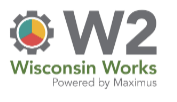Wisconsin Works team walks in clients’ shoes during simulation
Imagine being released from prison with no job, no home, and a long list of tasks to complete with few resources to assist. According to the U.S. Department of Justice, that is a reality for roughly 650,000 people every year.
Last fall, Maximus' Wisconsin Works (W-2) employees participated in a reentry simulation, which provides workforce services to applicants and employers. The event, sponsored by Employ Milwaukee, Inc., put workforce personnel, local and government leaders, and hiring officials in the shoes of recently incarcerated individuals.
The three-hour simulation gave participants a first-hand view of some of the barriers that justice-involved individuals face when returning home from incarceration, including finding housing, meeting with probation officers, obtaining mental and medical services, and legal requirements, said Ricardo "Ric" Ybarra, senior manager.
"Each participant is given a profile of a re-entering citizen, and then we took the profile and then had to walk through the steps and complete the tasks required of that person," Ybarra said. "We often work with these individuals and hear about their struggles, but we don't necessarily get an opportunity to experience what they're going through."
The event provided "invaluable insight" for participants, especially those tasked with helping people achieve a successful reentry, said A. Morgan, program director, adding that it also allows time for participants to self-reflect.
Morgan said that justice-involved individuals face significant obstacles when they are released back into their communities after incarceration.
"It was an emotional experience because I can better understand how someone in this real-life situation may feel hopeless or defeated," she said. "It would be easy to become overwhelmed when trying to find resources to assist you with meeting your basic needs. It's difficult to do if you don't know where to begin or what resources are available."
Morgan added that she hopes the simulation also helps to change biases toward previously incarcerated people.
"I believe people are often quick to say it's easy to find a job or resources and that they just aren't looking hard enough," she said. "However, when you go through this simulation, you begin to see there are a lot of restrictions, limitations, and barriers set in place that make it difficult to find the help and resources you may need. It's honestly not as easy as one might think."
Although the simulation only lasted a few hours, it offered a glimpse into what others may face. Failure to complete all the tasks assigned resulted in temporary reincarceration. The person then had to pick back up where they started or re-start some of the requirements, Ybarra said.
"I had to be reincarcerated because I did not fulfill my obligations of having enough job contacts," he said. "I had to come back and try and catch up on all the things I had lost during that short time."
Ybarra thought the simulation benefited participants but admitted that it was "overwhelming."
"After going through that whole simulation, I was drained; it was so emotional," he said. "We were debriefed and talked to individuals who have had to go through this experience. It opened my eyes more than I could have ever imagined. It was very enlightening, to say the least."
While many individuals who participated in the simulation are naturally empathic, it was a different experience to live it during the simulation, Ybarra explained.
Morgan said she hopes the event provided insight to professionals working with previously incarcerated individuals to help ensure their organizations are not causing additional challenges for them.
"Reentry back into society is difficult; it is a complex and unpredictable process," she said. "Successful reentry is not something that happens automatically upon release from prison; it has a greater chance of occurring if planned for accordingly. This simulation provides visibility into the perspectives of the returning citizens who we - as workforce services professionals - are here to help."
